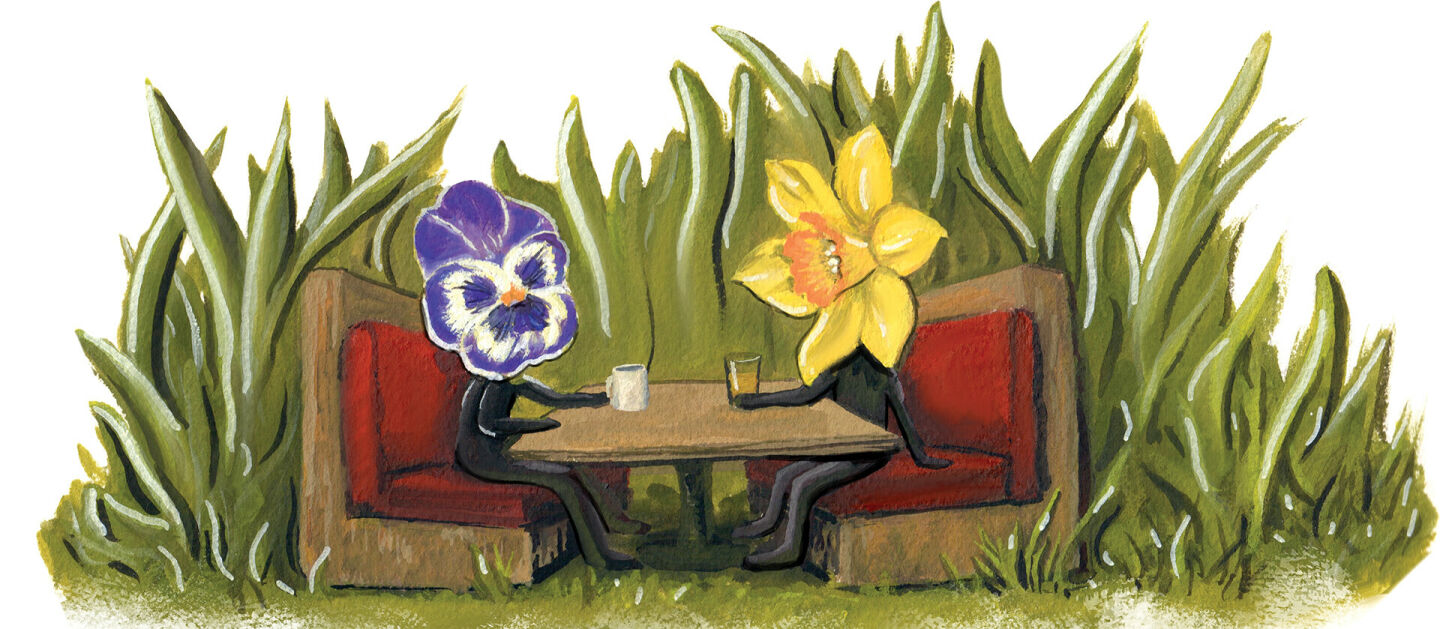
COLUMN: Like a Johnny Cash Song
becoming an adult means having the tough conversations – mostly with yourself
Samantha Kobs, illustrated by Caitlin Plaisance
Growing up and becoming an adult comes with many responsibilities. We stop closing down The Pickle on Friday nights. We open an investment account and maintain a diversified portfolio. We don’t forget our laundry in the washer for days at a time. But there is no adult task more difficult than that of finding closure after an adult-level heartbreak … a lesson I learned not long ago.
My understanding of closure had come from the lyrics of a Johnny Cash song titled “She Used to Love Me a Lot,” which I discovered in my impressionable college days. In the song, the narrator bumps into an old flame at The Silver Spoon Cafe and convinces himself that it would be easy to win her back. He recalls her undying love for him and questions his own decision to leave her. After striking up a conversation and suggesting they spend a night together and pick up where they left off, the woman turns on her heels and assures the man that though she’s “in need of something, it’s something he ain't got.” Shocked, the man watches her walk away.
This romanticized idea of closure had been living rent-free in my mind for years. Maybe it was possible that after being absolutely crushed romantically, I, too, could have a moment of redemption. And it was this image of the bold and self-assured woman getting the final word that prompted me to text my ex, asking if we could meet up to talk. I wasn’t trying to set him up or mislead him in any way, but I did want to get some things off my chest, and he was going to hear me out.
It had been a few years since we’d broken up, and I had always felt like there were so many things I never got to say. Though I’d left on my own volition and was in a healthy, happy relationship by now, I was still haunted by dreams of calls and texts that never went through to him. Even in my dreams, I didn’t get to say what I needed to say. But this was about to change – albeit against the advice of my therapist.
“Reflecting, forgiving, and moving on certainly isn’t as fun as the last call at The Pickle or the days before retirement planning.”
Samantha kobs
COLUMNIST
We met at the least romantic place I could think of – Randy’s Family Restaurant – largely because it fit the aesthetic I imagined in the song, and also because I probably wouldn’t run into other former boyfriends who could seriously throw off my plans. I’d rehearsed a few lines in my head. If all went well, I’d say all the things I’d been too afraid to say back then, the way he’d hurt me, the feelings of abandonment, and if I was lucky, the final word.
The conversation was clumsy at first. Despite multiple mirror run-throughs, I hadn’t planned out the transition from “Hey, how are you?” to “You really hurt me when…” and therefore, I got stuck in the “small talk” phase. I ended up asking about his family, his current projects, and his house that we’d lived in together.
In return, he asked about my family, my writing, and even my new boyfriend with the nice hair that he’d seen me with at the Mousetrap a year or so before. We talked about old friends, past travels, favorite recipes, and kitchen remodels. We talked about just about everything… except the things I’d hoped to discuss.
After several rounds of coffee, one thing had become abundantly clear: I would not abruptly cut to the chase, air my grievances, and get in the last word as that woman had done in the song. Our breakfast had become a reconciliation … a breakonciliation, if you will.
Turns out, life isn’t always like a Johnny Cash song.
Shortly afterward, as I made my way out to my car, I realized that my definition of closure had shifted. Rather than the final word or a petty, sitcom-style goodbye, perhaps closure was something much kinder: genuinely wishing the best for somebody who had hurt me in the past. Maybe even recognizing that I might have hurt them, too. Closure wasn’t something I would say as I grabbed my jacket and turned on my heels. It was actually just a healthy conversation with someone who I’d once cared for deeply and maybe still did.
Reflecting, forgiving, and moving on certainly isn’t as fun as the last call at The Pickle or the days before retirement planning. And it’s a hell of a lot more work. But it would be at the top of Maslow’s Hierarchy of Adulting if there were one, and it’s something more of us could strive to do.
It was with these thoughts in the parking lot of Randy’s Family Restaurant that I, Samantha Kobs, transcended to Adulthood.